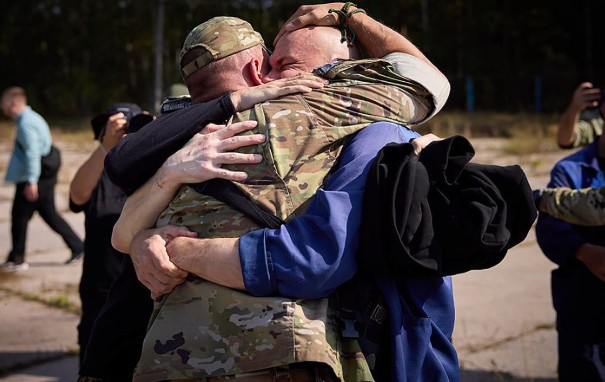Russia and Ukraine Exchange Prisoners, Bringing Home Dozens of Soldiers Amid Ongoing Conflict

In a rare yet heartening moment amid the brutal ongoing war, Russia and Ukraine have successfully carried out a significant prisoner exchange, resulting in the release of 300 soldiers, many of whom had been imprisoned for years. The exchange, which took place early this week, is a testament to the continuing, albeit fragile, negotiations between the two nations.
Images captured during the exchange depict dozens of soldiers making their way onto buses, heading back to their home countries. Once back in Ukraine, the released prisoners were met by their jubilant families, some greeting their loved ones in person for the first time in years, while others shared emotional reunions over the phone. The footage of these heartfelt reunions has provided a rare moment of hope for a war-weary world, reminding viewers that beyond the geopolitics, the human cost of war is immeasurable.
Ukrainian President Volodymyr Zelenskyy addressed the nation in a televised speech, confirming that the latest swap would bring 150 Ukrainian prisoners of war back to their homeland. He emphasized the importance of this exchange, acknowledging that many of the prisoners had been detained for years, living under harsh conditions. “Every life saved is a victory for Ukraine,” Zelenskyy said. “These soldiers were not just captives; they were symbols of our enduring resistance. Today, they return home, and their families are reunited.”
This prisoner exchange is part of a broader, ongoing effort between the two nations to bring back military personnel who have been held captive by either side since the conflict began. While these exchanges offer small moments of relief, they underscore the severe human toll the war has taken, with countless soldiers caught in limbo, waiting for a resolution to their prolonged captivity.
The release of these soldiers comes at a time when the conflict remains entrenched, with no clear end in sight. As the exchange took place, the broader political context remained volatile, with global powers closely monitoring any shifts in the situation. U.S. President Donald Trump, who is now beginning his second term in office, has expressed a renewed commitment to facilitating peace talks between Russia and Ukraine. Although the president’s position on the matter has evolved over the years, Trump’s recent statements suggest that he is ready to push for a resolution to the conflict.
In his address, Zelenskyy also spoke directly to the hopes of the Ukrainian people, reaffirming his readiness to engage in direct talks with Russian President Vladimir Putin. “I am prepared to sit at the table with Putin,” Zelenskyy stated, signaling his willingness to negotiate despite the grave challenges the two sides face. “It is time to end this war. Ukraine deserves peace, and we will continue to fight for it through all available means.”
The news of Zelenskyy’s willingness to meet with Putin has sparked both optimism and skepticism within diplomatic circles. For years, the prospect of direct talks between the two leaders has been clouded by distrust, accusations of war crimes, and unresolved territorial disputes. Yet, some experts believe that this prisoner exchange could signal a thaw in relations, or at the very least, a willingness to engage in more meaningful dialogue.
This exchange comes as the broader international community remains divided on how to address the crisis. Countries have been offering varying degrees of support, with many calling for a ceasefire or peace talks. Meanwhile, both Russia and Ukraine continue to mobilize military forces, signaling that despite this prisoner swap, the path to peace is far from clear.
The prisoner exchange is not only a significant event for the families of those directly involved but also serves as a poignant reminder of the human cost of the war. Many of the prisoners released have spent years in captivity under difficult and sometimes inhumane conditions. Some of the soldiers returning home have spoken out about the trauma they endured during their time in Russian prisons, with many stating that they were subjected to brutal interrogations, isolation, and constant fear.
For those left behind, the journey is far from over. There are still hundreds of soldiers and civilians caught in the conflict, and while some families have been reunited, others remain hopeful for a similar outcome. The exchange serves as a small victory in the larger struggle, but it is clear that much more needs to be done to ensure lasting peace.
As the conflict rages on, the international community watches closely, hoping that this rare moment of cooperation could lead to more meaningful progress. The possibility of direct talks between Zelenskyy and Putin remains uncertain, with many questioning whether such talks can lead to a meaningful ceasefire or even an end to hostilities. For now, the focus remains on the released prisoners and their return home—a poignant reminder that even amid the darkest times, moments of hope can still shine through.
The world now waits with bated breath to see whether this latest development will spark a larger shift toward peace or whether the road ahead will remain as uncertain and fraught as ever. For the moment, however, the release of these soldiers offers a glimmer of hope that, despite the deep divisions, dialogue and humanity may still find a place even in the most intractable of conflicts.
